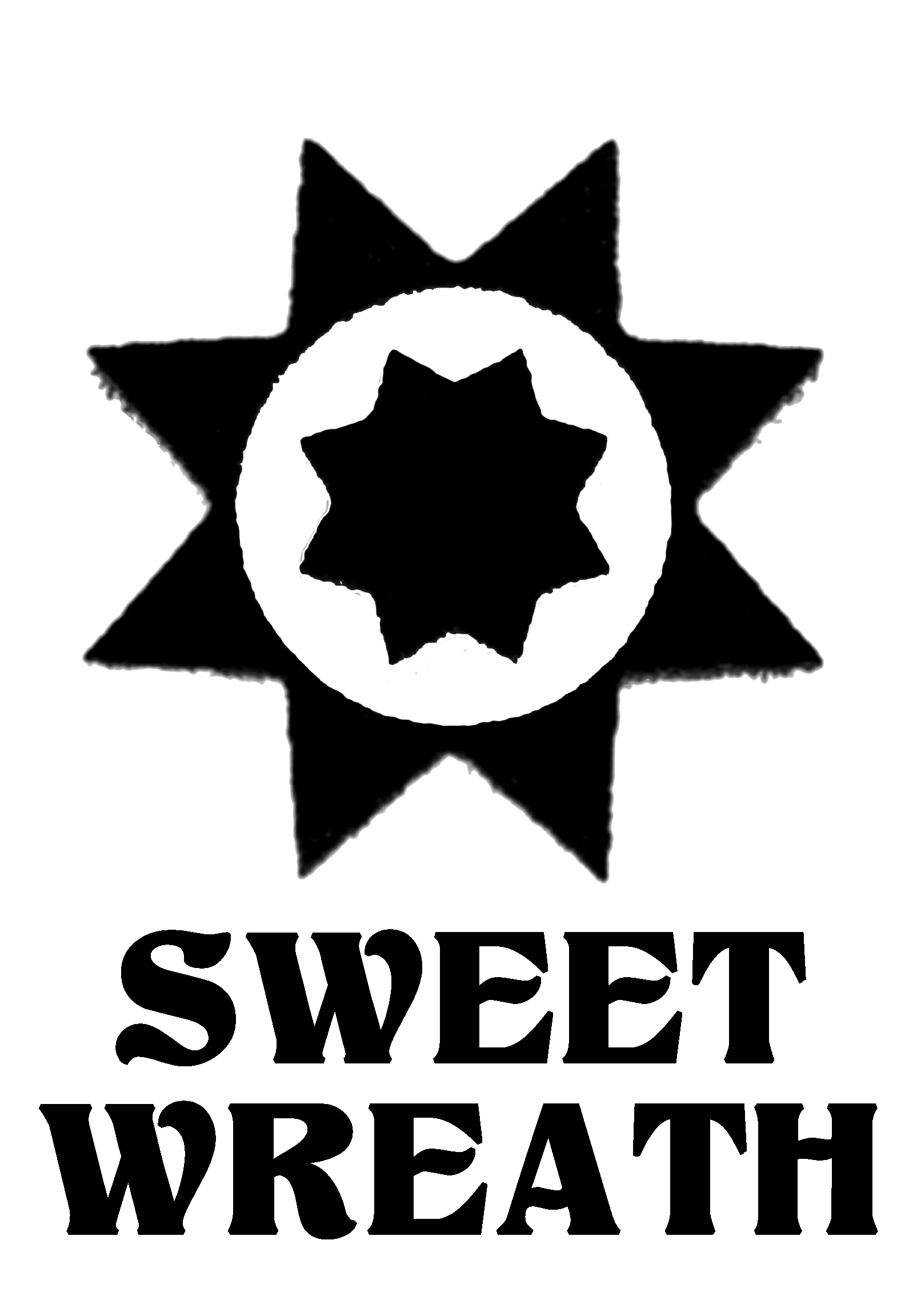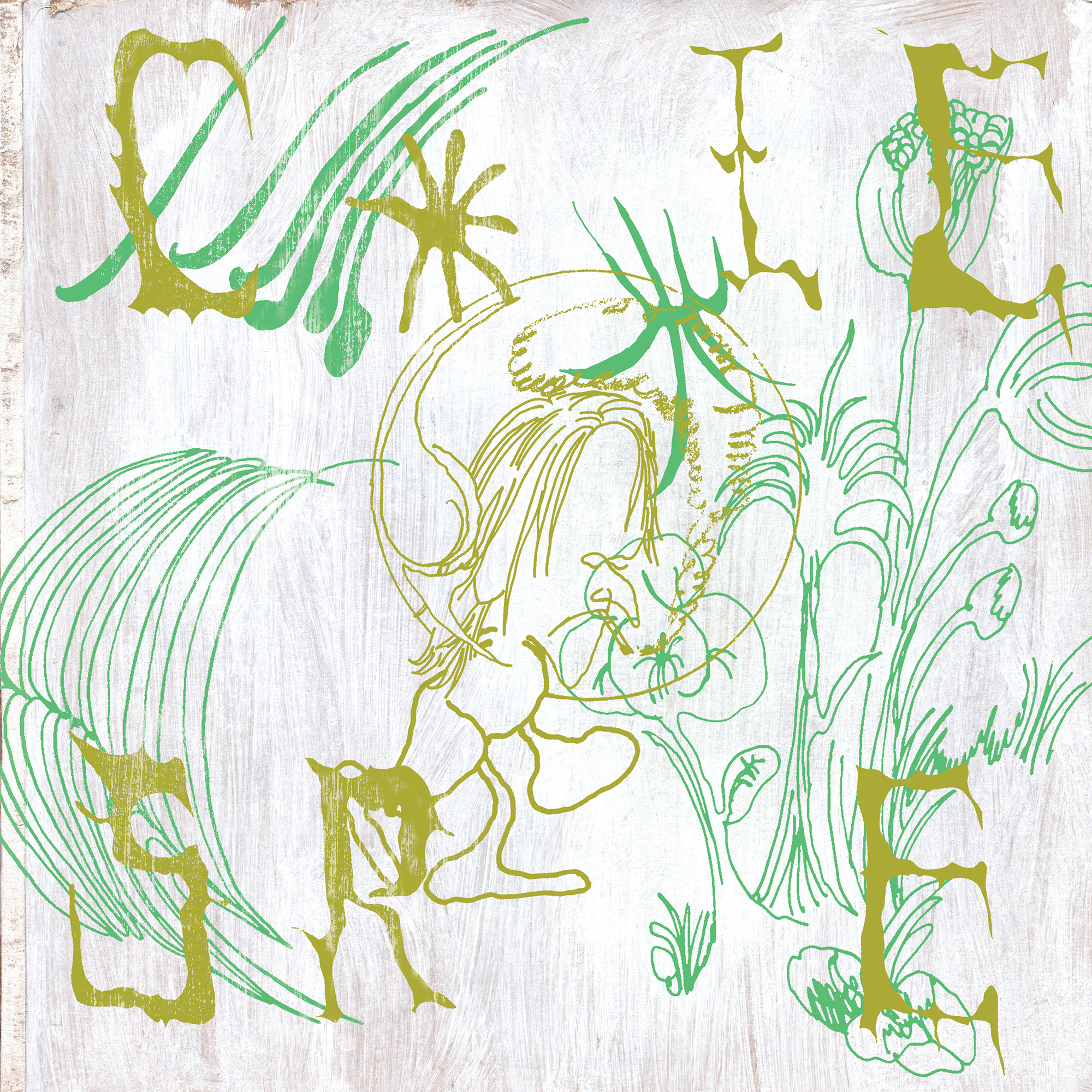
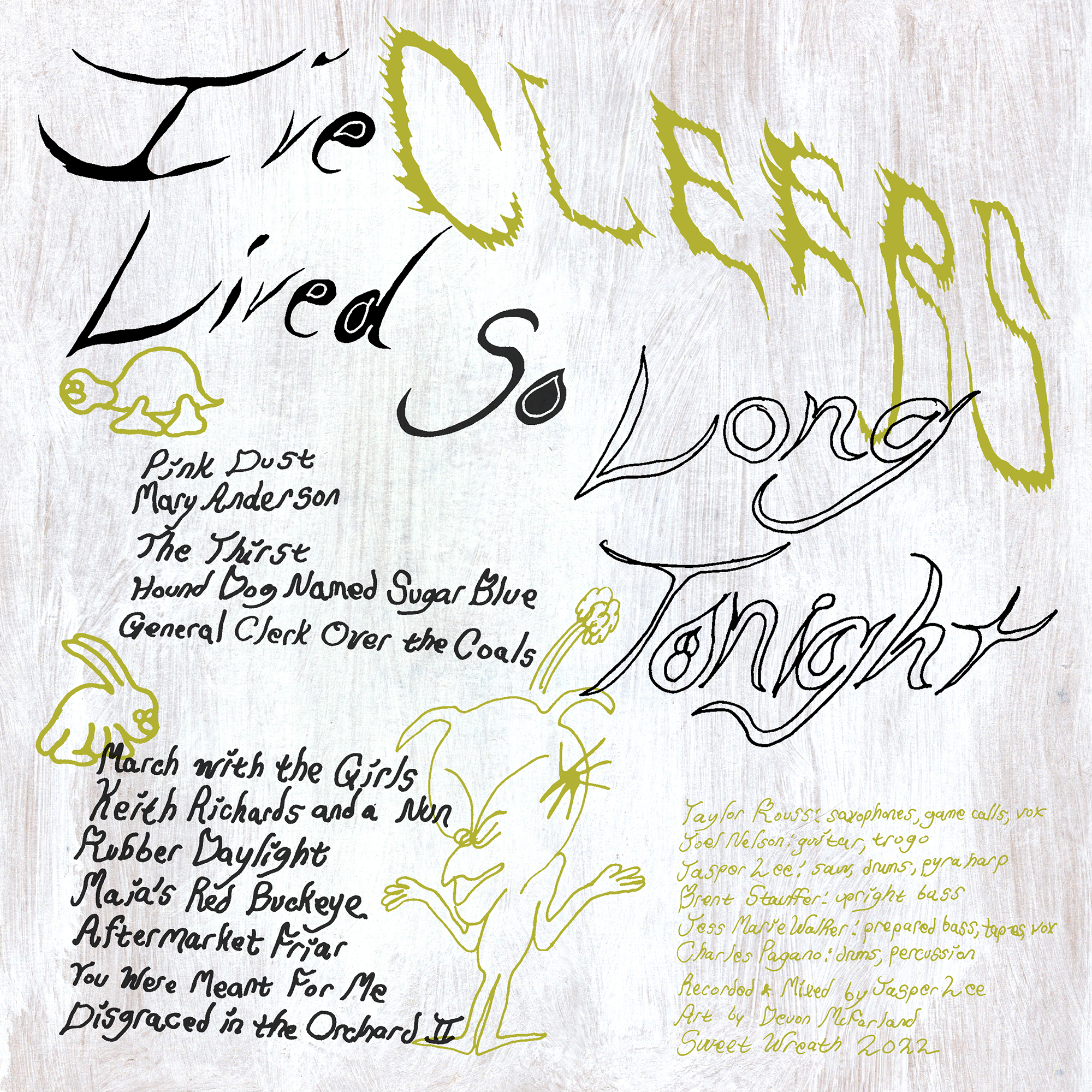
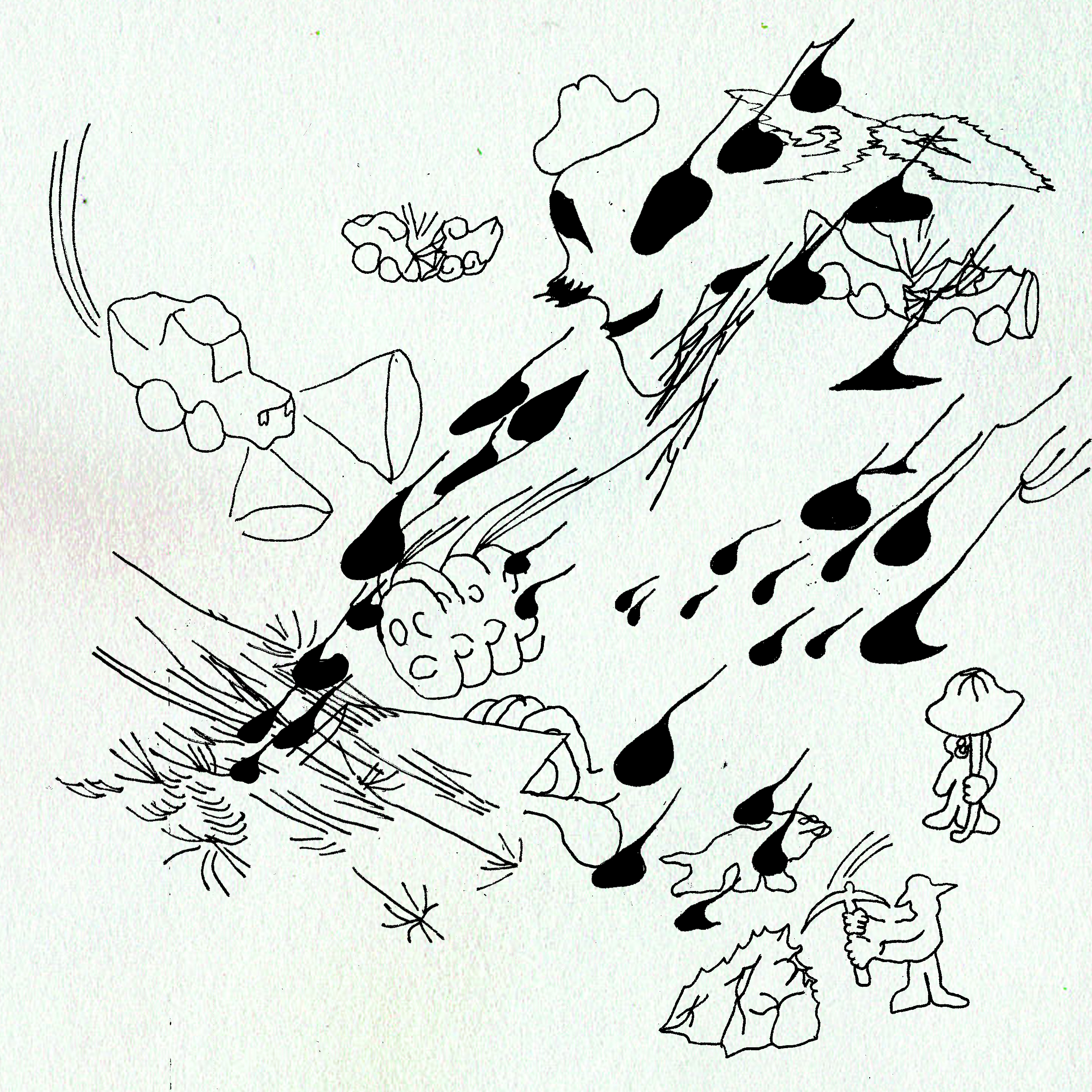
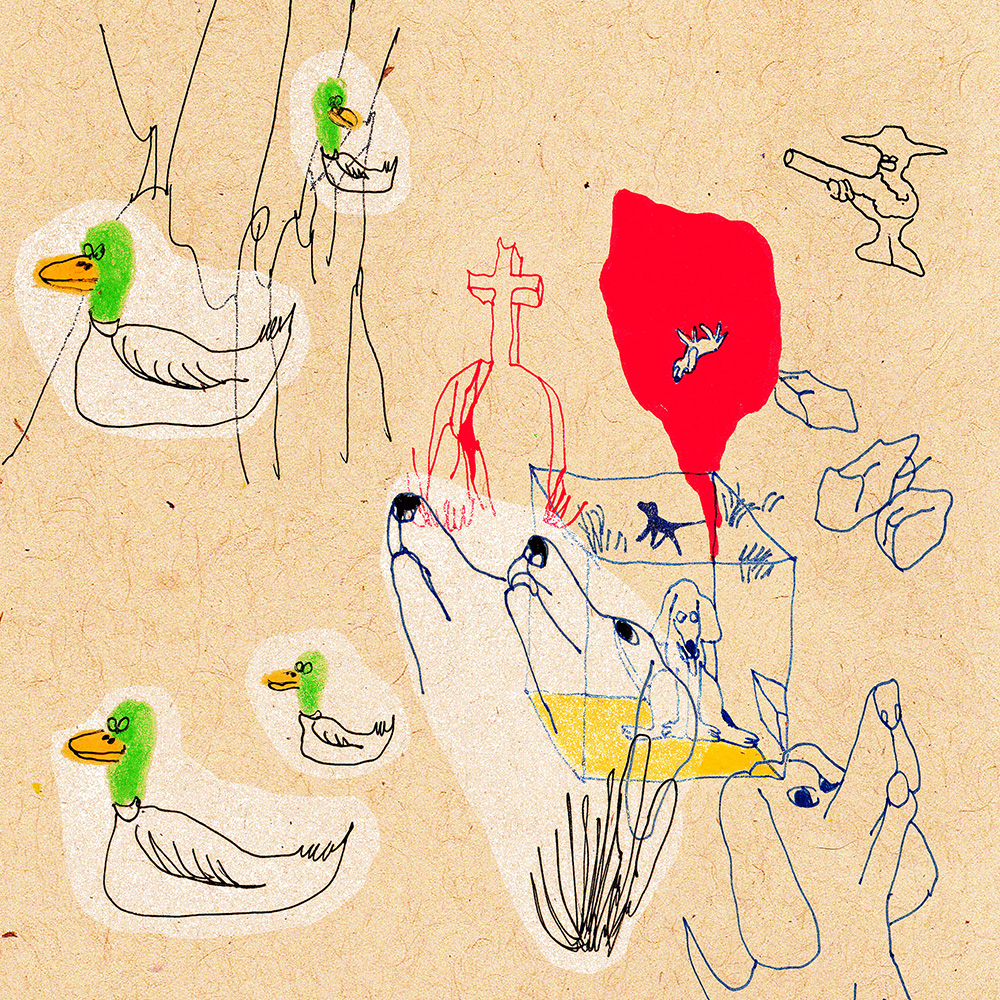
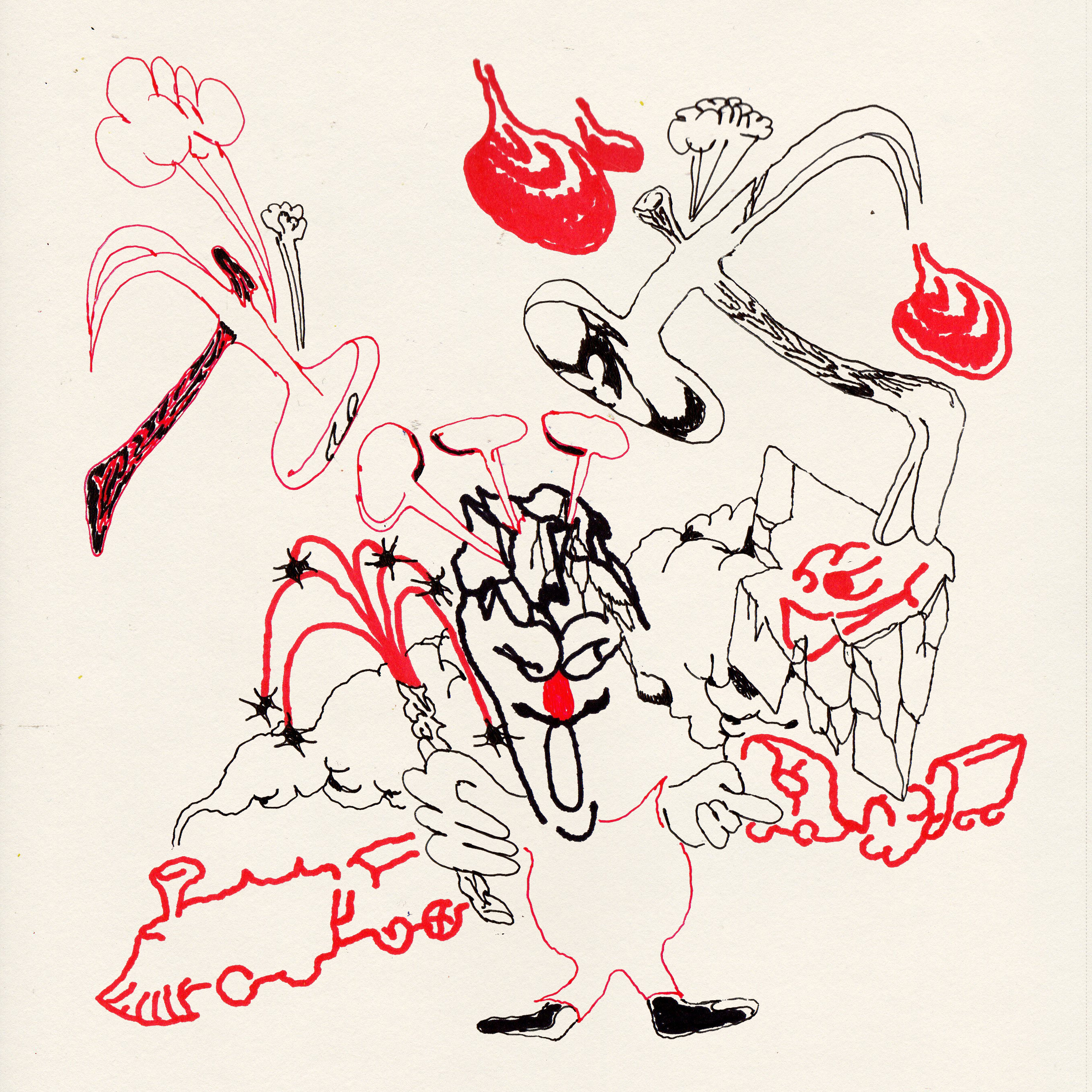
Cover Artworks by Devon McFarland
Cleers - I’ve Lived So Long Tonight
From the mutant mind of Taylor Rouss comes a deep dive into supernatural free jazz.
Cleers is an improv unit led by Rouss on saxophones and game calls with various
collaborators on an array of instruments. This collection offers an eclectic variety of
sounds and group interplay, while achieving a consistent mood through Taylor's sense
of humor and penchant for musical mischief. Character voices chime in out of nowhere
and game call squeals suggest a cartoonish alien language. The album starts off with a
musical dedication to Betty and Barney Hill, the first American couple to report being
abducted by aliens in September of 1961. Things get stranger from there, but eventually
wind up in the midst of performance recordings that capture the organic chemistry of a
unique group, at a certain time and place on planet Earth.
From the mutant mind of Taylor Rouss comes a deep dive into supernatural free jazz.
Cleers is an improv unit led by Rouss on saxophones and game calls with various
collaborators on an array of instruments. This collection offers an eclectic variety of
sounds and group interplay, while achieving a consistent mood through Taylor's sense
of humor and penchant for musical mischief. Character voices chime in out of nowhere
and game call squeals suggest a cartoonish alien language. The album starts off with a
musical dedication to Betty and Barney Hill, the first American couple to report being
abducted by aliens in September of 1961. Things get stranger from there, but eventually
wind up in the midst of performance recordings that capture the organic chemistry of a
unique group, at a certain time and place on planet Earth.
Pink Dust is dedicated to Betty and Barney Hill, the first American couple to report being abducted by aliens in September of 1961. Betty and Barney were driving through the mountains of New Hampshire when they saw a point of light which bounced around in the sky and eventually approached their vehicle. Several humanoid figures were seen in the windows of the craft which resembled the shape of a giant pancake. One figure communicated to Barney, telling him to "stay where you are and keep looking." The Hills quickly drove away but heard a rhythmic series of buzzing or beeping sounds vibrating their car and sending tingling sensations through their bodies. They then experienced an altered state of consciousness and returned to awareness after having traveled 35 miles. (there's a lot more details to this story which are worth looking up!) After they returned home from their encounter, Betty noticed her dress was torn and hung it in the closet. She later took it out to hang on her clothesline and discovered a pink powder on the dress which blew away in the wind.
Mary Anderson is dedicated to notable Birmingham figure and inventor of the windshield wiper, Mary Anderson! Mary was an entrepreneur who thought of the idea for the windshield wiper on a visit to New York in 1902. She was traveling aboard a trolly through the snowy streets, when she saw that the driver had to repeatedly get out of the trolly to clear the wet, icy windshield. When she returned to Birmingham, she hired a designer to assist in the creation of a blade that could clear the window and be controlled from inside the vehicle. Anderson sought and received a patent for her invention in 1903.
Continuing in a vein of music which evokes the stories of curious explorers, Cleers recorded a piece dedicated to Mary Anderson and her gift to travelers in all manner of vehicular craft. In the first half of the piece, you may hear what it's like to drive without windshield wipers. The second half of the piece is the sound of driving with windshield wipers. We present Cleers. Seen Cleerly. Through a Cleer window. A window of Invisible Sound. Mary Anderson, thank you.
A Hound Dog Named Sugar Blue is based around an improvised jam featuring T. Rouss on game calls and Jess Marie Walker on prepared bass and vocals. You can hear a snippet of her own tune Coffee Collard Water Sweet Black Coffee sung off-hand in the middle of the piece. The track evolves as a sort of collaged call-and-response between Sugar Blue and the ducks and wild creatures she's hearing out in the woods. An eerie mist envelops all things... a distant bell's chimes are fragmented and diffused through the dense damp fog. Cleers delivers their most abstract "single" yet.
How has working at a bar influenced your music making? The "thirst" theme of this new track seems to allude to that kind of environment.
I should preface that Gabriel's Cafe has been open for 30 years, 7 days a week. My uncle, 79, and my father, 77, are now my business partners. Strong Sicilian men. I'm forever grateful and I owe them everything, not to get too sentimental...
Here's a slew of anonymous/vague quotes from the bar:
"Y'know, so and so died..."
"Drunker than a watermelon sandwich"
"Taylor, you're awfully quiet today..."
"Y'all should do this! The other bars are doing it!"
I can't snore there. You start to feel like you know a bit of everything since everyone feels like they know everything. My tone isn't negative. The drama within the drama, genuine interactions with different walks of life, networking, people being present while dealing with something personal, it's all there in the music.
On a related note, you recently performed Walter Marchetti's "Music for Too Small A Glass" at Stephen Smith Gallery in Fairfield. Could you describe that piece and what it means to you personally? In what other ways are you influenced by Marchetti's work?
Thank you for asking this question. Walter Marchetti needs to be recognized and honored. He was an Italian composer who adopted John Cage's dadaist aesthetic and pioneered interactive and concrete music. In 1964 he formed the ZAJ group, the Mediterranean equivalent of Fluxus, with Juan Hidalgo in Madrid.
To me, there's a sense of sadness in "Music for too small a glass". I'm not going to say that the piece is about excessiveness or waste. Maybe he desired the company of someone. A new take on "My cup runneth over". Jamison Williams said that Marchetti probably wanted to drink.
I had a table, a chair, 12 beers that I removed the labels from and a solo cup. I forgot the pint glass at home. The piece asks that you pour all of the beer (I've seen performers use wine), one by one, into the glass causing it to overflow onto the table and onto the floor. Jasper's sound installation "Open the Gates" was playing in the background while I performed, but you could still hear the beer dripping from the table and onto the gallery's floor. I made sure Stephen Smith knew that I was about to make a big mess. Such a good sport!
Tell us a little about your use of game calls in your music. How did that begin and what is your approach to using them musically?
I have Walter Marchetti ("La Caccia", 1965) and Jamison Williams, my conceptual and artistic philosophy maestro, to thank for introducing me to game calls as legitimate instruments.
I am embracing a new experimental tradition by making use of the old. The primary use of game calls would be to mimic. You might hear similar sounds to a duck, goose, boar, deer, but I'm not hunting. These are reed instruments with percussive qualities. I have 73 vintage calls in my collection. The handspun, unmarked ones are my favorite to use. Even if I'm using multiple ducks, I can produce different sounds using techniques I've learned on saxophone depending on how the maker spun the wood and positioned the reed.
How do you decide when to play sax and when to play game calls?
When I have an idea for a saxophone, I generally have other local collaborators that I keep in mind. I also love playing duos with saxophone. It's intimate. Upright bass would be my favorite to play with. I just added Davey Williams' 1916 baritone saxophone to my collection thanks to LaDonna Smith. Such a prized possession.
I'm in a duo called Nexttimes with my friend and collaborator Joel Nelson. The name nods to how musical acts in a dive bar might name their group. Joel plays this synth that looks like a miniature, bulky keyboard and I play game calls. I feel like the classic noise it makes exquisitely compliments my game calls or vice versa. Squeaks, growls, tongue rolls, stabbing sounds, pops, etc. We create a harmony that lives in simplicity and conflict. (downright tongue-in-cheek)
Mary Anderson is dedicated to notable Birmingham figure and inventor of the windshield wiper, Mary Anderson! Mary was an entrepreneur who thought of the idea for the windshield wiper on a visit to New York in 1902. She was traveling aboard a trolly through the snowy streets, when she saw that the driver had to repeatedly get out of the trolly to clear the wet, icy windshield. When she returned to Birmingham, she hired a designer to assist in the creation of a blade that could clear the window and be controlled from inside the vehicle. Anderson sought and received a patent for her invention in 1903.
Continuing in a vein of music which evokes the stories of curious explorers, Cleers recorded a piece dedicated to Mary Anderson and her gift to travelers in all manner of vehicular craft. In the first half of the piece, you may hear what it's like to drive without windshield wipers. The second half of the piece is the sound of driving with windshield wipers. We present Cleers. Seen Cleerly. Through a Cleer window. A window of Invisible Sound. Mary Anderson, thank you.
A Hound Dog Named Sugar Blue is based around an improvised jam featuring T. Rouss on game calls and Jess Marie Walker on prepared bass and vocals. You can hear a snippet of her own tune Coffee Collard Water Sweet Black Coffee sung off-hand in the middle of the piece. The track evolves as a sort of collaged call-and-response between Sugar Blue and the ducks and wild creatures she's hearing out in the woods. An eerie mist envelops all things... a distant bell's chimes are fragmented and diffused through the dense damp fog. Cleers delivers their most abstract "single" yet.
How has working at a bar influenced your music making? The "thirst" theme of this new track seems to allude to that kind of environment.
I should preface that Gabriel's Cafe has been open for 30 years, 7 days a week. My uncle, 79, and my father, 77, are now my business partners. Strong Sicilian men. I'm forever grateful and I owe them everything, not to get too sentimental...
Here's a slew of anonymous/vague quotes from the bar:
"Y'know, so and so died..."
"Drunker than a watermelon sandwich"
"Taylor, you're awfully quiet today..."
"Y'all should do this! The other bars are doing it!"
I can't snore there. You start to feel like you know a bit of everything since everyone feels like they know everything. My tone isn't negative. The drama within the drama, genuine interactions with different walks of life, networking, people being present while dealing with something personal, it's all there in the music.
On a related note, you recently performed Walter Marchetti's "Music for Too Small A Glass" at Stephen Smith Gallery in Fairfield. Could you describe that piece and what it means to you personally? In what other ways are you influenced by Marchetti's work?
Thank you for asking this question. Walter Marchetti needs to be recognized and honored. He was an Italian composer who adopted John Cage's dadaist aesthetic and pioneered interactive and concrete music. In 1964 he formed the ZAJ group, the Mediterranean equivalent of Fluxus, with Juan Hidalgo in Madrid.
To me, there's a sense of sadness in "Music for too small a glass". I'm not going to say that the piece is about excessiveness or waste. Maybe he desired the company of someone. A new take on "My cup runneth over". Jamison Williams said that Marchetti probably wanted to drink.
I had a table, a chair, 12 beers that I removed the labels from and a solo cup. I forgot the pint glass at home. The piece asks that you pour all of the beer (I've seen performers use wine), one by one, into the glass causing it to overflow onto the table and onto the floor. Jasper's sound installation "Open the Gates" was playing in the background while I performed, but you could still hear the beer dripping from the table and onto the gallery's floor. I made sure Stephen Smith knew that I was about to make a big mess. Such a good sport!
Tell us a little about your use of game calls in your music. How did that begin and what is your approach to using them musically?
I have Walter Marchetti ("La Caccia", 1965) and Jamison Williams, my conceptual and artistic philosophy maestro, to thank for introducing me to game calls as legitimate instruments.
I am embracing a new experimental tradition by making use of the old. The primary use of game calls would be to mimic. You might hear similar sounds to a duck, goose, boar, deer, but I'm not hunting. These are reed instruments with percussive qualities. I have 73 vintage calls in my collection. The handspun, unmarked ones are my favorite to use. Even if I'm using multiple ducks, I can produce different sounds using techniques I've learned on saxophone depending on how the maker spun the wood and positioned the reed.
How do you decide when to play sax and when to play game calls?
When I have an idea for a saxophone, I generally have other local collaborators that I keep in mind. I also love playing duos with saxophone. It's intimate. Upright bass would be my favorite to play with. I just added Davey Williams' 1916 baritone saxophone to my collection thanks to LaDonna Smith. Such a prized possession.
I'm in a duo called Nexttimes with my friend and collaborator Joel Nelson. The name nods to how musical acts in a dive bar might name their group. Joel plays this synth that looks like a miniature, bulky keyboard and I play game calls. I feel like the classic noise it makes exquisitely compliments my game calls or vice versa. Squeaks, growls, tongue rolls, stabbing sounds, pops, etc. We create a harmony that lives in simplicity and conflict. (downright tongue-in-cheek)
